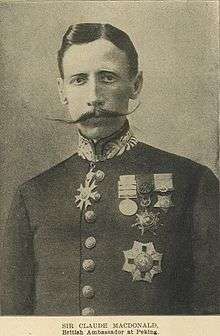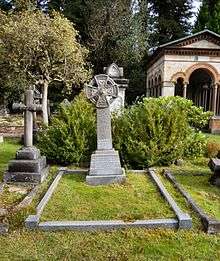Claude Maxwell MacDonald
Colonel Sir Claude Maxwell MacDonald, GCMG, GCVO, KCB, PC (12 June 1852 – 10 September 1915) was a British soldier and diplomat, best known for his service in China and Japan.[1]
Sir Claude Maxwell MacDonald GCMG, GCVO, KCB | |
|---|---|
 Sir Claude MacDonald, c. 1900 | |
| British Ambassador to Japan (British Minister to Japan, 1900–1905) | |
| In office 1900–1912 | |
| Monarch | Victoria Edward VII George V |
| Prime Minister | The Marquess of Salisbury Arthur Balfour Henry Campbell-Bannerman H. H. Asquith |
| Preceded by | Sir Ernest Mason Satow |
| Succeeded by | Conyngham Greene |
| Personal details | |
| Born | 12 June 1852 Morar, Gwalior, India |
| Died | 10 September 1915 (aged 63) London, England |
| Resting place | Brookwood Cemetery 51.297562°N 0.626209°W |
| Spouse(s) | Ethel Armstrong MacDonald (m. 1892–1915; his death) |
| Parents | James Dawson and Mary Ellen Macdonald |
| Education | Royal Military College, Sandhurst |
| Occupation | Soldier, diplomat |
Early life
MacDonald was born the son of Mary Ellen MacDonald (nee Dougan) and Major-General James (Hamish) Dawson MacDonald.[2] He was educated at Uppingham School and Sandhurst. He was commissioned into the 74th Foot in 1872. He thought of himself as a 'soldier-outsider', as regards his subsequent career in the Foreign Office.
Africa
MacDonald’s early career was in Africa. He served in the 1882 Anglo-Egyptian War, and served as military attaché to Sir Evelyn Baring from 1884–87. From 1887–89 he was Acting-Agent and Consul-general at Zanzibar, and then served some years as Commissioner and Consul-General at Brass in the West African Oil Rivers Protectorate,[3] where in 1895 he was an observer of the rebellion of King Koko of Nembe.[4] He retired from the British Army in 1896.[2]
China and Korea
In 1896, MacDonald was appointed Her Majesty's Minister in China. He was simultaneously the British Minister to the Empire of Korea in 1896 through 1898.[5]

In China, MacDonald obtained a lease at Weihaiwei, and obtained railway contracts for British syndicates. He was instrumental in securing the Second Peking Convention, by which China leased to Britain the New Territories of Hong Kong.[3] MacDonald secured a 99-year lease only because he thought 'it was good as forever'.[6] This and the contrasting lease-in-perpetuity of Kowloon created some problems in the negotiations for the 1984 Sino-British Joint Declaration.
In 1899 MacDonald was the author of a diplomatic note which proposed a new delineation of the border between China and British India in the Karakoram and Aksai Chin areas, which has come to be called the Macartney–MacDonald Line.
As a military man, MacDonald led the defence of the foreign legations in 1900 which were under siege during the Boxer Rebellion, and he worked well with the Anglophile Japanese Colonel Shiba Goro.
Japan
MacDonald was appointed Consul-General to the Empire of Japan in October 1900.[7] He headed the British Legation in Tokyo during a period of harmonious relations between Britain and Japan (1900 to 1912), swapping appointments with Sir Ernest Satow who replaced him as Minister in Peking. On 30 January 1902, the first Anglo-Japanese Alliance was signed in London between the Foreign Secretary Lord Lansdowne and Hayashi Tadasu, the Japanese Minister.

MacDonald was still in Tokyo when the alliance was renewed in 1905 and 1911. He became Britain's first ambassador to Japan when the status of the legation was raised to that of embassy in 1905. Before 1905 the senior British diplomat in Japan had simultaneously held the joint positions of (a) Consul-General and (b) Envoy Extraordinary and Minister Plenipotentiary; the latter being a rank just below that of ambassador. MacDonald was made a Privy Councillor in 1906.[8] He died in London of heart failure in 1915.[9] He is buried with his wife in Brookwood Cemetery.
Ethel, Lady MacDonald
In 1892, Claude Maxwell MacDonald wed Ethel (1857–1941), daughter of Major W. Cairns Armstrong; they remained married until his death in 1915. They had two daughters. Named to the RRC and a Member of the Executive Committee of the Overseas Nursing Association, Lady MacDonald was named Dame Commander of the Order of the British Empire in her own right in 1935.[10]
Selected works
In a statistical overview derived from writings by and about MacDonald, OCLC/WorldCat encompasses roughly 10+ works in 20+ publications in 2 languages and 300+ library holdings.[11]
- 1900 — The Japanese detachment during the defence of the Peking legations, 1900
- 1900 — Reports from Her Majesty's minister in China [Sir C.M. Macdonald] respecting events at Peking. Presented to parliament, Dec. 1900
- 1898 — Despatch from Her Majesty's minister at Peking forwarding copies of the notes exchanged with the Chinese government respecting the non-alienation of the Yang-tsze region[12]
Honours







See also
- List of Privy Counsellors (1901–1910)
- Anglo-Chinese relations
- Anglo-Japanese relations
Notes
- Nish, Ian. (2004). British Envoys in Japan 1859–1972, pp. 94–102.
- Kowner, Historical Dictionary of the Russo-Japanese War, p. 214.
- Dictionary of National Biography
- Sir W. Geary, Nigeria under British Rule (1927), pp. 194–96
- Korean Mission to the Conference on the Limitation of Armament, Washington, D.C., 1921–22. (1922). Korea's Appeal p. 32., p. 32, at Google Books
- Preston, Diana. The Boxer Rebellion. Bloomsbury Publishing USA, 2000, ISBN 0802713610, pg. 370.
- "No. 27263". The London Gazette. 4 January 1901. p. 81.
- The London Gazette: no. 27978, page 8967: 21 December 1906
- Diana Preston, page 333, "A Brief History of the Boxer Rebellion", ISBN 1-84119-490-5
- Edith, Lady MacDonald, named Dame Commander of the Order of the British Empire, thegazette.co.uk; accessed 5 March 2016.
- WorldCat Identities Archived 30 December 2010 at the Wayback Machine: Profile: Sir Claude Maxwell MacDonald (1852–1915)
- MacDonald, Claude M. (1900). Reports from Her Majesty's minister in China respecting events at Peking: Presented to both houses of Parliament by command of Her Majesty, December 1900. Volume 364 of Cd. (Great Britain. Parliament). H.M. Stationery Office. Retrieved 1 April 2013.CS1 maint: ref=harv (link)
- "No. 27337". The London Gazette (Supplement). 25 July 1901. p. 4915.
References
- Nish, Ian. (2004). British Envoys in Japan 1859–1972. Folkestone, Kent: Global Oriental. ISBN 9781901903515; OCLC 249167170
- Kowner, Rotem (2006). Historical Dictionary of the Russo-Japanese War. Scarecrow. ISBN 0-8108-4927-5.
External links
| Wikimedia Commons has media related to Claude Maxwell MacDonald. |
- UK in Japan, Chronology of Heads of Mission
| Diplomatic posts | ||
|---|---|---|
| Preceded by William Nelthorpe Beauclerk as Chargé d'affaires |
British Minister to China 1896–1900 |
Succeeded by Sir Ernest Satow |
| Preceded by Sir Nicholas O'Conor |
British Minister to Korea 1896–1898 |
Succeeded by John Jordan as Chargé d'affaires |
| Preceded by Sir Ernest Satow |
British Minister to Japan 1900–1905 |
Succeeded by Himself as Ambassador to Japan |
| Preceded by Himself as Minister to Japan |
British Ambassador to Japan 1905–1912 |
Succeeded by Sir Conyngham Greene |